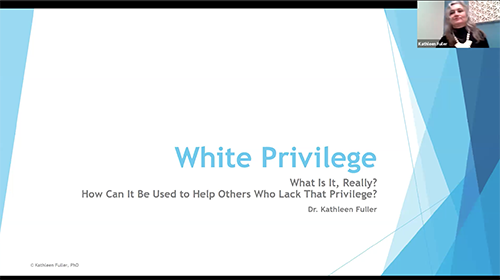White Privilege: What is It Really? How Can It Be Used to Help Others Who Lack That Privilege?
In this webinar, Dr. Fuller explains the term “white privilege”—who has it and why. Anthropologists use the term “enculturation” to describe how we learn what family, community, and society look like. The norms we enculturate as children may incorporate implicit biases which become invisible to us as adults. Until recently, white men predominantly created institutions and set the agenda in United States government, business, and higher education. For much of the population, there may be comfort in this familiar norm. But this frame of reference chafes and harms many others. The term “white privilege” is used to raise awareness that one person’s norm can be another person’s harm.
During this webinar, Dr.Fuller presents examples that give participants a clearer idea of what white privilege is. She also discusses ways we can use our privilege to help others and ways in which implicit biases can be made explicit and frames of reference can be changed.
Learning Outcomes:
- Be able to explain white privilege.
- Become more aware of implicit biases and frames of reference and how these may impact interactions with colleagues and students.
- Learn how to use white privilege to help those without it.
- Understand how following a diverse set of individuals on social media can reduce implicit biases and alter frames of reference which can improve our interactions with colleagues and students.
- Determine appropriate ways to intervene in situations that may lead to conflict among colleagues and students.
Dr. Kathleen Fuller is an Adjunct Professor of Anthropology at Metropolitan Community College-Maple Woods. She played an active role in shaping diversity, equity, and inclusion at Johnson County Community College, the University of Kansas School of Medicine (KUMC-SOM), and MCC-Maple Woods. While at KUMC-SOM, Dr. Fuller developed the Center for the Study of Race and Ethnicity in Medicine. She has given seminars and lectures on diversity and inclusion to the American Association of Colleges and Universities, the Meeting of South Florida Dermatologists, Texas Christian University Conference, Diversity in Teaching and Learning in American Higher Education, and the Central States Anthropological Society. Her scientific publications can be accessed on Google Scholars Page. She also writes extensively on equity and inclusion in her blog: Display Adaptability.
Please Note:
Only those attending the LIVE webinar will receive a certificate of attendance. Thank you!


